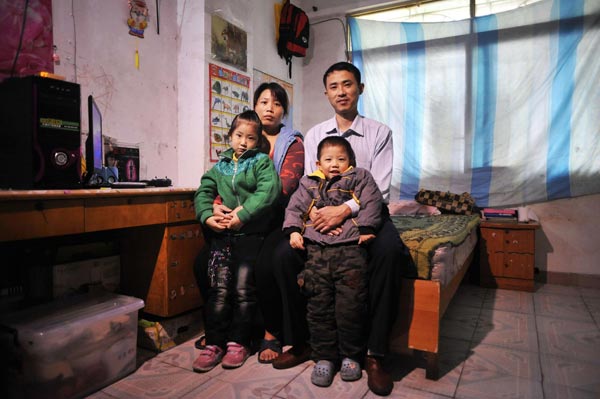 |
|
Migrant worker Gao Changliang (L), his wife Gao Qingfang, daugther Gao Zihan, and son Gao Zihao pose for a picture in?a rented room in Guangzhou, Guangdong province on Jan 21, 2013 before going back to their hometown in Anyang, Henan province for the Spring Festival. [Photo/Xinhua] |
An opportunity to get home came on Monday, when a Beijing West Railway Station clerk told him he could buy a high-speed train ticket to his home city of Sanmenxia, in central China's Henan Province.
Wang refused.
"Even the cheapest high-speed train ticket costs more than 400 yuan (64 U.S. dollars)," he said. "That's nearly four times as much as a normal ticket but it cuts down the travel time by five hours."
Wang makes about 2,000 yuan a month as a security guard in the capital city.
However, "normal train tickets" are no longer available until February 7, the clerk told him.
The most important Chinese holiday, the Spring Festival, falls on February 10 and migrants want to get home to see their families.
The Ministry of Railways (MOR) forecast the holiday travel rush, which starts on January 26 will last until March 6.
"I have no idea how to get home in time now," he told Xinhua Tuesday.
Wang joined millions of migrants trying to buy tickets last Friday, in the hope that new policies, which allow passengers to buy tickets 20 days in advance, would have made life easier.
However, the policies, which encourage passengers to book tickets on the Web or over the phone and make electronic payment left many migrants and elderly people at a loss.
Wang, for example, has never used online ticketing websites or telephoned ticket service hotlines, nor does he have an online banking account.
He said he simply believed that the early bird catches the worm.
However, the old saying failed him and many others.
Li Qiao and her husband failed to get tickets to their home city of Liaocheng in east China's Shandong Province, through both the online ticketing service and at Beijing railway station counters.
The couple bought bus tickets even though the fare was more expensive than taking the train.
"We need to get home early," said Li. "We haven't seen our daughter for over a year."
MASS EXODUS
According to data from Hitwise, a division of Experian that measures website traffic, the average daily hit of 12306.cn, the official train ticket booking website, has topped 120 million since January 16.
Chinese people are expected to make 3.4 billion trips during the holiday travel period, and the volume of railway passengers is estimated at 220 million, Wei Ruiming, a MOR official said Tuesday.
In extreme cases, the anxiety over tickets can drive people crazy.
After failing to get train tickets, a man surnamed Wu decided to drive his family of seven back to Shaanxi from Qinghai Province in his four-seater car last week.
Wu had five adults in the four seats and squeezed two nine-year-old boys into the trunk.
He had driven about 22 hours when traffic police officers saw a hand reach out of the trunk.
Police stopped the car and fined Wu, telling him he had to find another way to transport his family.
While the majority of migrant workers and students choose to travel by train for its cost-effectiveness, a ticket is one of the hardest commodities to get in China.
However, some people have their own ways.
Pei Jiyang, a Peking University student, is known as the "Ticket King", as he has booked more than 200,000 train tickets for his friends and other migrant workers in the past three years.
He does not charge for his services and is acclaimed as a hero.
Pei has published some of his ticket strategies on the web.
However, a couple in south China's Guangdong Province ended up in jail for helping others secure train tickets.
Zhong Quanzhen and his wife, surnamed Ye, have been detained by Guangdong police and may spend Spring Festival in jail, after they helped others buy tickets and charged 10 yuan for each one.
Police said the couple's service was unauthorized by railway authorities and they were suspected of ticket scalping.
Their neighbors and customers have protested, saying the couple did not deserve such a punishment.
"We gave them money and our identification cards, and they would buy tickets for us," said one of the couple's customers, whose family name is Yang.
Yang said she was grateful to the couple because they spared her the time and trouble of having to wait hours outside a ticket agency. "Even the ticket agency charges 5 yuan per ticket, so I think it's quite acceptable that they charge twice as much for their better service."
The couple's plight has drawn widespread attention.
"The case has been misjudged," said He Bing, vice president of the law school of China University of Political Science and Law.
"Indeed, the couple were not authorized to sell tickets because they did not have a license for such business operations," said He. "But they only bought tickets for people in need and charged a reasonable price, which is normal practice in a market economy."
He said the police should release the couple.
With the clamping down on unlicensed sales it only makes it harder for people like Wang Yougong to find a way of getting home.
